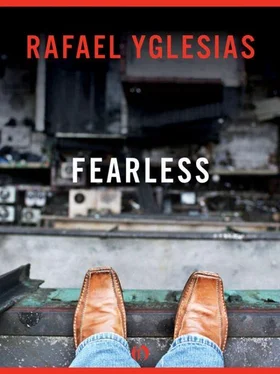No sleeping baby nestled in the yellow-and-white-print couch. She dropped onto it heavily. One crutch kicked up and banged the coffee table. It vibrated. The lawyer put a soothing hand on the glass and said, “No harm done.”
Across from her, on the credenza, in a silver frame, was the portrait of Bubble taken by the same man who had photographed her wedding. It was one of a series of photos that Manny had mailed off to modeling agencies. Carla hadn’t objected to the cost and the fuss because she agreed with Manny: Bubble was such a beautiful boy, probably companies would want him to sell their products.
“Did you hear that?” Manny demanded of her. “They had seats that would have made a difference. Do you believe that? They can’t get away with this. It’s wrong. You know?” Manny was serious. He paced in front of the glowing red drapes. “I don’t care about the money. You understand?” Manny was talking to the lawyer. He had a grim expression on his face. His eyes were intense. Carla assumed Manny was saying that he didn’t care about money to improve his chances of getting the lawyer to ask for a lot. She knew that he cared about the money, that he had been poor his entire life, that he blamed everything on his lack of money, probably even the crash. It was ridiculous hearing him say he didn’t care. Manny persisted in his theme: “If they aren’t made to pay for this, then they won’t do anything about fixing it so other babies won’t die.”
“That’s the way the world is.” The lawyer cocked his head at Carla and twisted his small lips back and forth. “Corporations don’t volunteer to do the right thing. They have to be persuaded by the economics. Look at what the car companies tried to do to Ralph Nader.”
“What?” Manny asked eagerly.
The lawyer was taken aback momentarily. “Ralph Nader, the consumer advocate?”
“I don’t know about him,” Manny said freely. “What about him?”
“The car companies — he wrote a book about unsafe cars — and they sent girls, you know, ladies of the night, to his apartment, hoping to get him into trouble. They sent a couple of goons to threaten him—”
“They did that?” Manny shook his head. He seemed truly surprised and disappointed that American corporations would behave so badly. “What happened?”
“Didn’t work. That’s why we have seat belts and air bags and all—” the lawyer seemed to wind down. He came to a stop, small flat hand poised in midair, his nervous head still. “What am I talking about?” he asked the floor.
Brillstein was like a precocious little boy, Carla thought. His hair had thinned; his pale skin was tough and there were wrinkles around his eyes and mouth; but he had the nervous energy of a smart child, an intent, asexual creature pretending to be grown up.
“How are you?” Brillstein suddenly asked Carla, pivoting on his feet, pointing his small hands at her, a teacher calling on her to answer.
She didn’t. She looked back at him in a friendly way, she hoped, although she wasn’t going to smile. He didn’t care how she was, not really, so why answer?
“Carla…?” Manny said gently.
Brillstein held up a hand to stop her from answering. “I’m here to introduce myself. This is a horrible time for you. No money, nothing the law can do will change what’s happened. But you’re entitled, you deserve to be compensated for what’s happened. It could have been prevented. They could have been better prepared. If they had been more careful your son would still be alive.”
He seemed sincere. His small eyes were intent and dark with passion. She believed him. She nodded, to be encouraging, but she still said nothing, mostly because she wanted to be out of the room and back in bed. She didn’t want to look at her living room with it so clean and neat.
Brillstein sat on the love seat at an angle to the couch. He perched on its edge, head slightly bowed, hands together, an aging choirboy, although of course he was Jewish. “The airline, the plane manufacturer, all of them, they know they’re in the wrong and they already want to make things right. But they need to deal with a lawyer and you need to have someone who knows—”
“We need an expert, Carla,” Manny interrupted, exasperated by the gradual logic of the lawyer’s speech.
She gave Manny a dark, angry look. He obviously thought she had turned into an idiot. He talked to her as if she were retarded. “I know it’s cruel to have to talk about it, to tell”—Brillstein gestured to himself—“strangers about what happened to you and your boy. Why is it our business?” Brillstein stared down at the coffee table and shook his head. “It’s cruel.”
This is crap .
“I’m tired,” Carla said. She reached for her crutches.
“We have to have a lawyer!” Manny said and flopped his arms up and down, a frustrated bird trying to take off.
“I know,” she mumbled, annoyed.
“This is crazy,” the lawyer said and they both stared at him. “I know this is a crazy process. But I have to know, any lawyer would have to know, what happened to you during the crash. If you don’t want to tell me directly, that’s okay. I have a tape recorder”—he gestured toward the hall—“in my bag and I can leave it and you can tell it to the machine or you can tell your husband and he can tell it to the machine.”
“She doesn’t have to go to court?” Manny asked with wonder and hope.
“Oh, I don’t think we’ll go to court. I don’t think anybody’s going to want to go to court about this. They want to settle. They want to negotiate. But I have to have the facts — and that’s all that your telling me would be for — so I can know what the facts are before talking with them. If I don’t know what happened to you I can’t even start to have that conversation with them. I’m not promising you won’t have to give a deposition — do you know what that is?”
Carla nodded. She knew. “People in the neighborhood,” she said quietly, “have given depositions.”
Brillstein laughed suddenly and quite hard at that. “I bet they have,” he said. “You’re a funny person,” he said and then looked solemn. “I admire you for your strength.”
“I don’t remember what happened,” Carla said. “You can leave your tape recorder but there’s nothing I got to say.”
“You blanked out? You have no memory?” Brillstein came right to the edge of the love seat, his knees thrust forward. The glass table seemed about to cut them in half. “Have you told her doctors?” he asked Manny.
“Well…” he stammered.
“Why?” Carla asked. “Why do they have to know?”
“You know, I handle quite a few medical malpractice and accident cases. I know a little bit about medicine. Memory loss can be caused physiologically. Probably it’s not. But that should be checked.”
“Oh, they checked her brain!” Manny said with an enthusiasm that irritated Carla. “They gave her a scan, all that. She’s fine.”
He’s always saying you’re fine .
“You should check again,” Brillstein addressed Carla. He seemed to really care. “You know, those scans are accurate and yet there’s always the ability of the technician reading it and sometimes the scans can miss something. You may have developed a problem since then. I don’t mean to scare you,” the lawyer put a hand on Carla’s arms. He had to leave the love seat altogether to reach her, but he didn’t stand up, he remained squatting in the air on an invisible seat. “But you should have another CAT scan of the brain.”
Carla was scared. What did he think was happening to her? A brain tumor? Her heart pounded and she was afraid.
Of what? Not of death. She wanted to die.
Читать дальше












